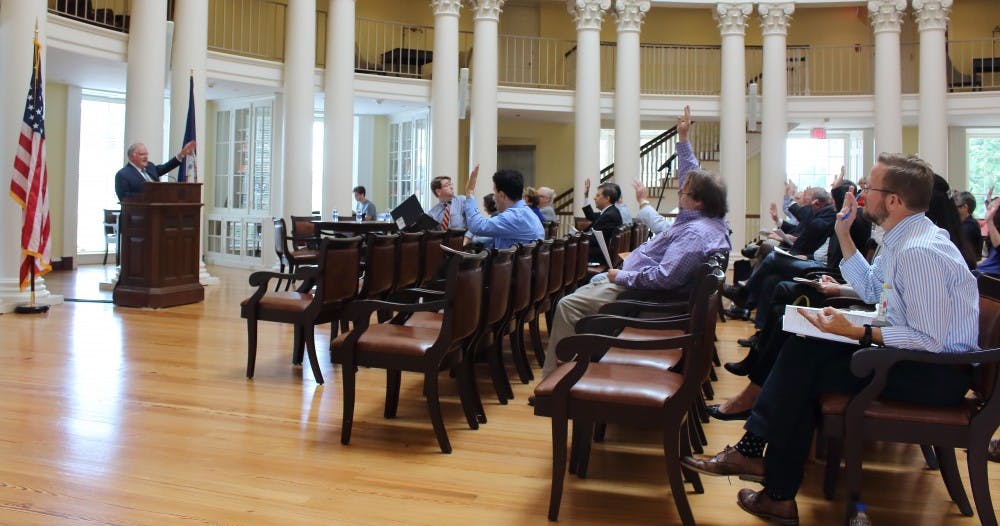University President Teresa Sullivan and Law School Dean Risa Goluboff met Thursday afternoon to discuss the University’s response and efforts in the wake of the events of Aug. 11 and 12. Both Sullivan and Goluboff later addressed a meeting of more than 40 members of the Faculty Senate in the Dome Room of the Rotunda.
Sullivan began her address by acknowledging how the beliefs expressed on the steps of the Rotunda Aug. 11 and downtown Charlottesville Aug. 12 by white nationalists — racism, anti-Semitism, homophobia and Islamophobia, among others — are antithetical to the values of the University.
The violent white nationalist events of that weekend ultimately turned deadly when a car plowed through a group of people protesting the Aug. 12 “Unite the Right” rally, ultimately resulting in at least 35 injuries and the death of 32-year-old Heather Heyer.
“I do want to talk about some of the action we’ve taken since Aug. 11 and 12,” Sullivan said.
She then listed a number of steps the University has taken toward increasing safety measures on Grounds including expanding University police coverage, extending the ambassador program to include areas on Grounds — including Lawn rooms — and reviewing state and University laws concerning weapons on Grounds.
The University has also hired security consulting firm Margolis Healy & Associates to conduct a comprehensive review of the existing security infrastructure.The University is spending $250,000 for Margolis Healy & Associates’ services.
Sullivan also addressed the Deans Working Group she charged with assessing the University’s response to the events of Aug. 11 and 12.
“They have created a website to be a central hub for their efforts,” Sullivan said. “There you will find … Resources, updates and a community input form.”
Goluboff, chair of the Deans Working Group, identified three main focuses of the group’s efforts.
“If point one was safety and security going forward, point two is looking inward and asking how can we learn from this as a community, how can we grow as a community,” Goluboff said. “Point three are institutional questions, we have to respond to this as a University … What kinds of institutional investments should we be making in order to take the next steps?”
Goluboff mentioned the need for the University to address social justice and civil rights and continue to grapple with the history of race at the University.
“We are now in a position to lead in a lot of different ways and I think that’s what we should do,” Goluboff said.
The microphone in the center of the room was then opened to any faculty member who wished to speak. Many acknowledged and appreciated the efforts of the University before sharing their thoughts about what should have been handled differently or actions that should be taken going forward.
Asst. Nursing Prof. Ishan Williams said she was tired of the University and community handling such situations with too much politeness. She instead encouraged action and a change in culture.
“We have got to start standing up and saying something,” Williams said. “We need to stop worrying too much about the politeness … And just start helping people out.”
Assoc. English Prof. Sylvia Chong also acknowledged a culture of politeness at the University and insufficient responses to Aug. 11 and 12.
“I didn’t feel validated in the University's official communications … Even the tone in the way we deal with these things, I feel could be changed,” Chong said.
Chong also commented on Sullivan’s note of an increase in policing on Grounds to ensure safety.
“Safety to me doesn’t mean more policing,” Chong said.
A number of professors shared a desire for more spaces and opportunities to engage in open dialogue about recent events and for students and faculty to share their thoughts.
“It starts with us being able to talk it out and hear each other … Creating conversations like this where people can express what their concerns are,” Drama Prof. Gweneth West said.
A common theme throughout the meeting was looking forward towards healing and recovery.
“[We need to] make sure that these events aren’t tragic in two senses — one that they occurred, two that we didn’t learn from them,” Goluboff said.







